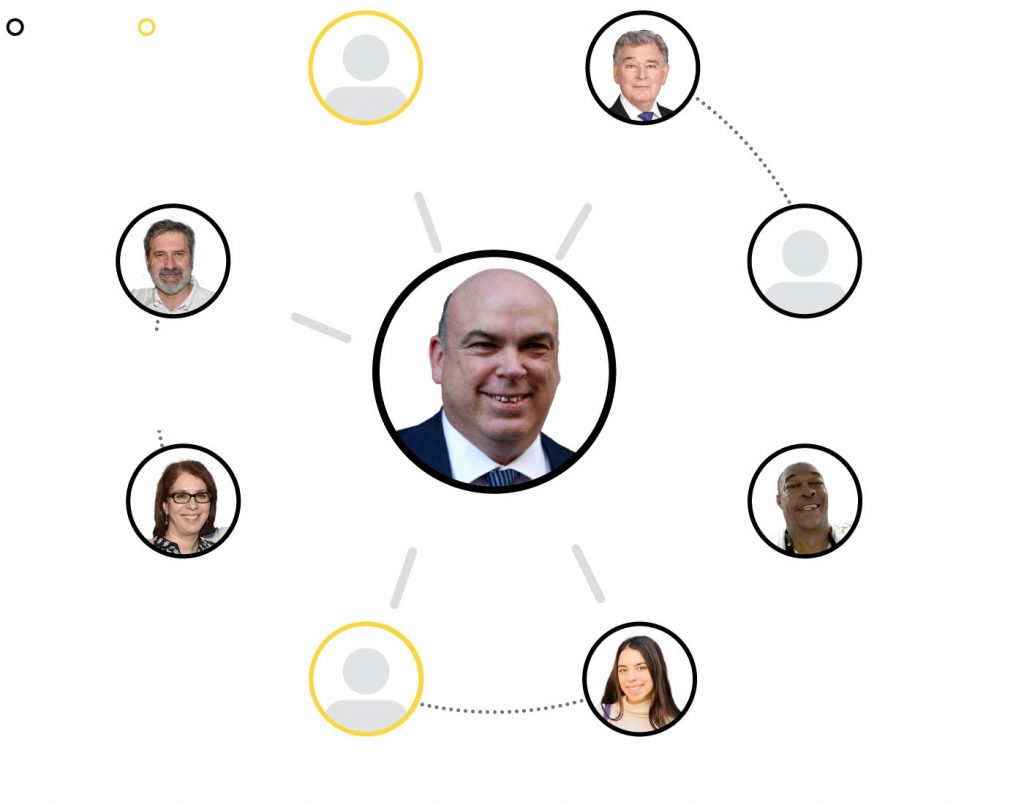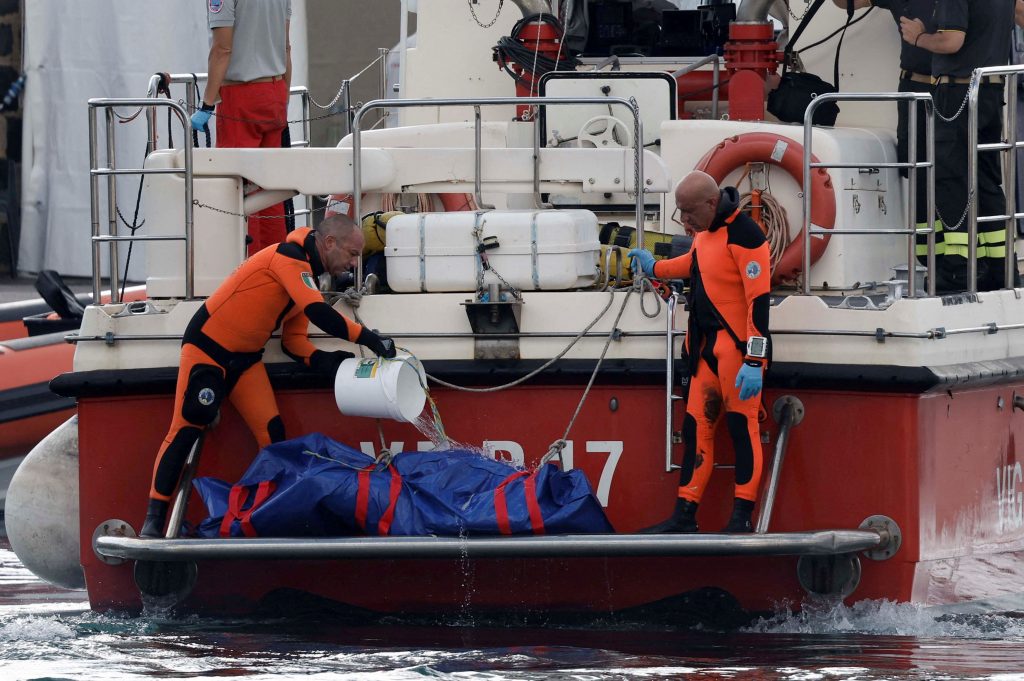PORTICELLO, Italy—The sun set over a calm Mediterranean Sea as the Bayesian approached this small fishing town on the north coast of Sicily.
On the teak deck of the 180-foot superyacht, British tech mogul Mike Lynch was enjoying a new lease on life together with his family, friends and lawyers after his against-the-odds acquittal in a California trial.
The 59-year-old software entrepreneur, once hailed as the British Bill Gates, was celebrating with his wife and daughter, along with big names in law and banking in New York and London, and others who had helped him during his years fighting what the U.S. Justice Department had alleged was a massive accounting fraud. Friends joined and left as Lynch crisscrossed the Mediterranean, including stops at Positano and Palermo.
Lynch vowed to keep the maritime celebration rolling. He told another of his lawyers, Brian Heberlig, who had begged off this summer’s festivities because of other travel plans, that he wouldn’t be allowed to miss next year’s trip.
Amid the festivities came a shock on Sunday. Lynch’s co-defendant, Stephen Chamberlain, who had also been acquitted, had just been fatally hit by a car while out for a run at home in England. From the yacht, Chris Morvillo, a former U.S. prosecutor who had helped lead Lynch’s defense for more than a decade, emailed Heberlig and other legal colleagues to share the tragic news.
The Bayesian dropped anchor for the night a short distance outside the harbor wall of Porticello, in a wide bay east of Palermo. The lights on its aluminum mast—once the world’s tallest, but now eclipsed by a vessel owned by Jeff Bezos—shone like a Christmas tree as night fell.
Mike Lynch’s Circle on the Yacht
Among the 22 aboard the Bayesian were friends who had stood by Lynch during his legal fight

The day had been sunny and hot. The night was clear and starry.
It was an unusual place for luxury yachts to linger, said local fishermen. The exposed spot offered less protection than the waters beneath the nearby mountain of Capo Zafferano, or the much larger port of Palermo.
And there was a storm warning. Porticello’s fleet of around 30 seaworn fishing boats were all inside the harbor wall as fishermen decided against going out to work that night.
The storm struck shortly before 4 a.m.
“The sea was an inferno for 15 minutes. Then it was calm again,” said local fisherman Giuseppe Balistreri.
When the lashing rain eased, the Bayesian was gone.

Rescue personnel pour water on a body bag containing the corpse of British entrepreneur Mike Lynch, who died when a yacht owned by his family sank off the coast of Porticello, near the Sicilian city of Palermo, Italy, August 22, 2024. REUTERS/Louiza Vradi
Divers struggle
Heberlig received a phone call on Monday morning from a U.K. number he didn’t recognize. He thought it was Morvillo, calling to commiserate about Chamberlain. Instead, it was someone else, calling to tell him that tragedy had also struck Morvillo, Lynch and others on the yacht.
Since Monday, Italian authorities have been investigating what caused the Bayesian to sink in a matter of minutes a few hundred yards from the harbor. They have interviewed survivors, reviewed photos and closed-circuit television footage and are analyzing the wreck, including with an underwater drone.
A prosecutor is probing whether possible crimes were committed, including manslaughter and causing a shipwreck through negligence. No decision to place anyone under investigation has been made yet, according to a judicial official.
It took salvage divers five days and 123 dives to search the yacht for bodies as it lay on its side on the Sicilian seabed. In the darkness 160 feet below the surface, divers found its tight corridors were blocked by furniture, electric cables and other debris.
On Thursday, Lynch’s body arrived in the harbor in a blue body bag. The bodies of five other passengers have also been recovered from the yacht: Morvillo and his wife, Neda, a jewelry designer; Morgan Stanley International Chairman Jonathan Bloomer and his wife Judy; and Lynch’s 18-year-old daughter, Hannah, the last to be brought ashore on Friday.

British tech entrepreneur Mike Lynch and his daughter, Hannah Lynch, pose for a photo, in this undated handout image obtained by Reuters on August 23, 2024. Lynch Family Handout/Handout via REUTERS
The ship’s cook, Recaldo Thomas, was found lifeless in the sea soon after the boat went down.
Lynch’s wife, Angela Bacares, was among the survivors, along with five other guests and nine of the 10 crew.
From the harbor wall of this modest fishing port, international media and curious locals watched the somber progress of coast-guard boats bearing shrouded cadavers. Investigators questioned the yacht’s surviving crew and passengers at a nearby vacation resort. Local fishermen wondered how such an impressive vessel could have sunk in a sharp but short tempest.
“It breaks my heart to think that these people died so close to where I cast my nets,” said Balistreri.
The surviving crew members of the Bayesian, secluded by Italian authorities, were unavailable for comment. The Lynch, Bloomer and Morvillo families declined to comment.
Gone in minutes
Throughout its history, the Mediterranean Sea has been known as much for its treachery as for its beauty. Sudden storms have sunk ships here since humans learned to sail.
In recent years, the Mediterranean has become a graveyard for thousands of migrants from poor or war-torn countries, who continue to drown while trying to cross the hazardous sea in rickety boats in search of safety or a better life in Europe.
The Bayesian’s Italian manufacturer has angrily rejected suggestions by some marine engineers that the yacht’s 240-foot-high aluminum mast might have contributed to the accident, instead accusing the crew of a series of mistakes that led to the boat taking on water in the storm until it capsized.
The speed with which the $35 million boat disappeared under the waves has flummoxed even seasoned maritime accident investigators. “In my many years of accident investigation I can’t recall anything similar to this,” says Gavin Pritchard, a former investigator at the U.K. Marine Accident Investigation Branch, who probed sunken wrecks for a decade.

‘Saying goodbye to everything’
A few weeks earlier, in June, Lynch had hugged his weeping wife in a San Francisco courtroom after a jury found him innocent of fraud and conspiracy. Around him, a legal team co-led by Morvillo, some of whom had devoted many years to Lynch’s defense, was also in tears.
The British mogul had earlier resigned himself to spending the rest of his life in a U.S. prison. Lynch was flown in chains last year from London to California to face his trial over allegations that he had artificially inflated the value of Autonomy, a software company he founded, when he sold it to Hewlett-Packard in 2011 for more than $11 billion. “It’s a 0.7% acquittal rate,” he later said in an interview. “You basically go round saying goodbye to everything.”
It was a twist of fortune for a man who spent most of his career feted as a rare example of a British tech titan. Lynch, who grew up in London, the son of a nurse and firefighter, started out with a secondhand computer and a Ph.D. in mathematical computing from Cambridge University, drawing on the work of 18th-century statistician Thomas Bayes.
In 1996 Autonomy was spun out of a company called Cambridge Neurodynamics, which was an early venture into using machine learning to trawl data sets. Quickly a stock-market darling, Autonomy offered software that used Bayes’s techniques to process massive amounts of data for clients ranging from banks to intelligence agencies.
Lynch cultivated a hard-charging sales culture, had a piranha tank in the office and named conference rooms after James Bond movies. Lynch drove one of Bond’s favorite types of cars, too, a vintage Aston Martin.
HP’s acquisition of Autonomy gave Lynch a payday of about $800 million. Lynch stayed on, while investing some of his wealth in raising rare breeds of cows and pigs at his English farm.
In 2014, a company owned by his wife, Angela, bought the fateful yacht, made six years earlier by Tuscan luxury boat builders Perini Navi, and renamed it Bayesian after the statistician.
HP claimed that Lynch and senior finance executives had cooked Autonomy’s books. Lynch, who denied this, was fired from the company in 2012.
Morvillo, 59 years old and a senior partner at law firm Clifford Chance in New York, became Lynch’s attorney—a prominent federal prosecutor for the Southern District of New York who had worked on cases linked to the Sept. 11, 2001, terrorist attacks and money laundering. Lynch’s case would consume a third of his professional life, and the two men became close friends.
Lynch and Morvillo argued that HP had botched the integration of Autonomy and was trying to pin its wider corporate failings on him. Lynch said that Autonomy’s accounting was in line with other software companies’.
In 2018, the U.S. government charged Lynch, alleging that he and his lieutenants had used false and misleading documents to make Autonomy more attractive to a potential buyer.
In May 2023, after losing a fight against extradition to the U.S., Lynch said goodbye to his six dogs, his wife and two daughters, walked around the corner from his West London home, and was ushered into a waiting police car which drove him to Heathrow airport.
He spent the next year living under house arrest in a San Francisco townhouse, with an electronic tag on his ankle, CCTV cameras in multiple rooms, and guarded by armed ex-Navy SEALs to make sure he stayed put. His family had posted a $100 million bond. He bought a sheepdog puppy for company.
Tears in the courtroom
Lynch faced trial along side Chamberlain, a former finance official at Autonomy. During the three-month trial, which involved around 16 million documents, Lynch’s lawyers argued that he had acted in good faith and wasn’t an expert in arcane accountancy matters.
Lynch’s defense team also leaned on a key witness, Bloomer, a City of London grandee and chairman of Morgan Stanley International, who had formerly chaired Autonomy’s audit committee.
The defense team gambled and got Lynch to testify. “You and I have met a lot, right?” Morvillo asked Lynch in the witness stand. “You’re probably sick of me at this point?”
“It’s a bit like we’re married sometimes,” Lynch responded, to laughter in the courtroom.
The jury cleared Lynch and Chamberlain on all 15 counts. Bacares rushed into the well of the courtroom, where spectators aren’t allowed, and threw her arms around her husband.
“I’ve never seen a moment like it in the courtroom before,” Morvillo recalled, talking on the podcast For the Defense. “Grown people sobbing, hugging, people clapping. It was remarkable.”
Lynch described the verdict as a fork in the road of his life. “It’s Schrödinger’s cat,” he later said. “You open the box and you are in one universe or the other.”
‘Only the captain knows the truth’
Rising sea temperatures in the Mediterranean are leading to more frequent maritime tornadoes known as waterspouts: short-lived but powerful twisters made of air and water that can lift up or capsize boats.
Locals in Porticello say such a tornado hit the yacht. But the Bayesian should have been able to withstand it.
“As a fisherman I ask myself: How can a boat of 56 meters sink, even if a waterspout passes directly over it?” said Balistreri. He said the biggest danger is if a boat at anchor gets sideways in the wind and the sea pours in over the gunwale and into the hold.
“Only the captain knows the truth,” he said.
In the last year there were over 600 waterspouts around Europe, according to the European Severe Weather Database.
Giovanni Constantino, chief executive of the Italian Sea Group, parent company of the Bayesian’s manufacturer, told Italian media that the yacht could sink in such a storm only if it took on too much water while tilting in the gale with open doors or hatches.
The crew should have prepared the ship, given the storm forecast, including by closing all doors and gathering the passengers, he said.
CCTV footage from the shore shows how the Bayesian with its brightly lit mast leans hard to starboard. The lights go out as the gale hardens. That could indicate a power failure caused by water flooding into the yacht, Constantino said.
The wind and rain intensify so much that the yacht disappears from view in the video.
Data from MarineTraffic, a maritime-information provider, shows both the Bayesian and the Sir Robert Baden Powell, anchored nearby, drifting southeast when the storm hit, suggesting their anchors were slipping. The captain of the Dutch ship, Karsten Börner, turned his engine on and maneuvered to keep his stern to the wind, avoiding being pushed sideways, he told reporters later.
Within minutes, after the storm had passed, Börner said he looked around but could no longer see the Bayesian. The crew of the sinking yacht fired a red flare, spotted also by some local fishermen, who sped out in their boats to help.
Börner saw and picked up an orange inflatable life raft, carrying 15 survivors of the Bayesian.
Seven people—Lynch and his daughter, the Morvillos and the Bloomers, and the cook Thomas—hadn’t made it out of the yacht in time.




